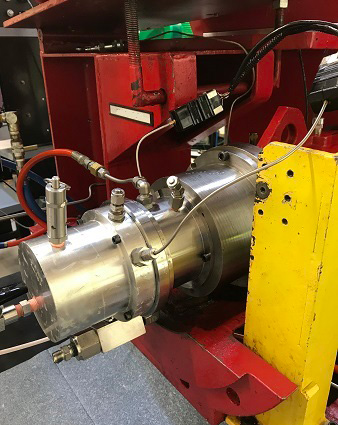Using KLS® Seals to Retain an Abrasive Pressurized Fluid

When KLS seals are used as RCD seals, or in similar abrasive service, we recommend that they be used in pairs, with the lubricant between them pressure-balanced to the pressure of the abrasive fluid. The pressure-balancing can be accomplished with small pistons or diaphragms. The basis for this recommendation is testing indicating that:
- With differential pressure, abrasive exclusion is inconsistent, regardless of lip configuration.
- Without differential pressure, abrasive exclusion is good.
We performed four long-term tests of 3.375” lip seals at 615 rpm (543 SFPM) with an ISO 150 viscosity grade lubricant, using drilling fluid as the abrasive fluid. The surface speed of the tests is equivalent to a 10.375” RCD mandrel turning at 200 rpm, however the seals were exposed to 3.08 times more runout cycles, compared to a 10.375” RCD seal.
Two zero pressure differential tests (#83, #86) that were performed with PN 668-4 seals were shut down at 265 hours for seal inspection. Both seals were still in very good condition. One of these tests had no significant runout, and the other had about 0.010” runout, FIM. The drilling fluid temperature in these tests was about 155 to 162°F.
Two tests (#73, #93) were performed with seals that have the same overall geometry as the PN 668-4 seals but lack the hydrodynamic waves that are necessary to survive high differential pressure operation. Test #73, which had 0.010” runout, zero pressure differential, and 162°F drilling fluid, was shut down at 145 hours to inspect the seals, which were in good condition. Test #93, which had no intentional runout, 5 psi pressure differential, and 197°F drilling fluid, was shut down at 201 hours to inspect the seals, which were in good condition.
We intend to repeat this abrasive exclusion testing with actual 10.50” KLS-type RCD seals during the winter of 2018/19. We are presently tooling up to produce those seals. For a list of available sizes of KLS seals, see our shaft seal catalog. Please contact our staff for more information.
